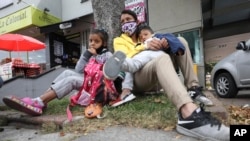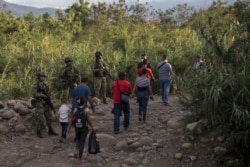Gunfire echoes from a nearby “trocha,” an informal border crossing, where Venezuelan migrant Yuberthi once made her living.
Yuberthi would scrape money together to pay for a room in the nearby border town and feed her 12 and 4-year-old kids by carrying the bags of border-crossers between Venezuela and Colombia. Her last name has been withheld for her security.
But since battles for territorial control between armed groups in the region have deepened, those dirt and river passageways have turned deadly. The hundreds of corridors have become frequent sites of rape and other gender-based violence, and Yuberthi left in search of other work.
Unable to make ends meet, Yuberthi was forced into survival sex, risking trafficking and exploitation the streets near the border, charging less than $4 a person.
She risked trafficking and abuse, including violence. Oftentimes, those men work with militias, she said.
Still, selling sex to survive seemed safer.
“I’ve been doing it for months because I don’t like that my children go to bed without eating,” Yuberthi said. “I see working in the trochas as healthier, but you face a lot of danger in the trochas.”
Aid workers, local officials and researchers warn that intensifying armed group violence along the border has strengthened human trafficking networks and deepened gender-based violence. Migrant women like Yuberthi bear the brunt of the consequences.
The Venezuelan border has always been a hub for militias: Right-wing paramilitaries, Colombian guerrillas from the National Liberation Army, ELN, dissidents of the demobilized guerrilla group Revolutionary Armed Forces of Colombia, FARC, and the Venezuelan Tren de Aragua criminal organization.
Territorial war
The groups use the border for trafficking and to escape the grip of Colombian law enforcement. Conflict between the criminal organizations has deepened in past years, but only in recent months has the territorial war escalated in urban zones like Cúcuta.
“There are just accelerating rates of intensity. It’s a constant reconfiguration of control, and a constant contestation for the trafficking corridors,” said Elizabeth Dickinson, an analyst with Crisis Group. “That’s trafficking of goods, of drugs, of weapons, and of course, of people,”she said.
In June, a car bomb at a military base supposedly carried out by FARC dissidents left 44 people injured including two U.S. military advisers. Weeks later, gunmen fired on Colombian President Iván Duque aboard his helicopter near the city’s airport.
The violence has intensified during the pandemic, which has created conditions that make the city ripe for groups to prey on vulnerable migrant populations, explains Ana Teresa Castillo, an aid worker living at the mouth of one of the informal border crossings.
“La Parada has always been violent, but right now, the situation is an economic war,” said Castillo, as smoke lingered from a recent clash near her house. “There’s no work and a lack of opportunities.”
Castillo and other women’s groups reported that they have recently seen more cases of sexual violence perpetrated by illegal actors, specifically members of the Venezuelan Tren de Aragua gang, which has been making power grabs in a zone once largely controlled by Colombian fighters.
In late July, Colombia’s Ombudsman Office, which oversees the protection of human rights, warned of a troubling uptick in the targeting of women, including killings and sexual violence in the region.
Over the past year and a half, the office said it received more than 830 reports of gender-based violence, though observers say that is likely a fraction of the actual cases due to low reporting and impunity.
“The Ombudsman's Office rejects these acts of gender-based violence and makes an urgent call to the authorities to carry out .. urgent and effective investigations of the events that occurred,” said Ombudsman Carlos Camargo in a statement.
Aid organizations in the zone say those warnings have gone unheeded and that the cases of trafficking and sexual violence they see are more extreme than before.
Child prostitution
“Right now we’re seeing girls of 14, 13, even 8 years old in the streets prostituting themselves,” Castillo said. “A few nights ago, I saw little girls of 8 years old out at 10 p.m. at night prostituting themselves.”
Colombian police rejected the criticisms.Officials told VOA they have active operations combating trafficking networks in Cúcuta, and blamed neighboring Venezuela for making it easier for the criminal organizations to traffic.
Yuberthi said she has endured violence and abuse in her sex work because, she said, she has no other choice.
“The men are abusive. You have to put up with violence and they want to manipulate you, as if you’re not worth anything,” she said.
She said the men would physically hurt her, force her into sex acts she did not want to do, and verbally abuse her.
Yuberthi keeps the sexual violence a secret from her children, dropping them off at a local education center in the morning, trying to earn money during the day, and picking them up at night.
She said she doesn’t let her daughter walk outside the small apartment they share with nine other migrants because she worries gang members will prey on her.
Armed groups seek control
Dickinson said gender-based violence serves a strategic purpose for the armed actors.
“The fact that they’re moving to target specifically women is, first of all, an indicator of the depth of the conflict under way,” she said. “It's also an indicator that these groups are seeking more than territorial control, they’re also seeking social control.”
That is also compounded by deepening impunity, explains Magaly Castañeda, director of Fundación Frida Kahlo, an organization that helps human trafficking victims.
Castañeda and other organizations said they cannot officially report human trafficking networks and cases of sexual violence because they will receive threats and become targets of violence by the perpetrators.
“We denounce anonymously, why do we do it anonymously? Because we don’t want it to affect our security, to be a target for human trafficking networks,” Castañeda said. “It’s a risk. It’s a high risk that we take.”
While aid leaders like Castañeda express worry that the situation will only continue to worsen, Yuberthi also worries, but says she has to focus on the day-to-day.
“I want to leave this all behind. I don’t want to live like this anymore,” she says, “But I also don’t want my daughters to live through the same thing I have.”









